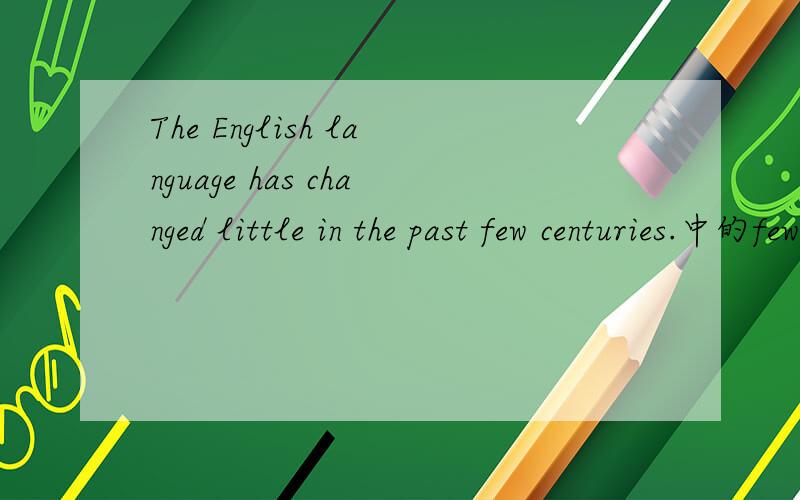The English language has changed little in the past few centuries.中的few littleThe English language has changed little in the past few centuries.中的few little是不是双重否定 然后意思就是 在很少的世纪中英语几乎没有改变
来源:学生作业帮助网 编辑:作业帮 时间:2024/04/29 17:41:41

The English language has changed little in the past few centuries.中的few littleThe English language has changed little in the past few centuries.中的few little是不是双重否定 然后意思就是 在很少的世纪中英语几乎没有改变
The English language has changed little in the past few centuries.中的few little
The English language has changed little in the past few centuries.中的few little是不是双重否定 然后意思就是 在很少的世纪中英语几乎没有改变 就是说在一些世纪中英语改变很多 是这样的吗?
The English language has changed little in the past few centuries.中的few littleThe English language has changed little in the past few centuries.中的few little是不是双重否定 然后意思就是 在很少的世纪中英语几乎没有改变
不是双重否定
"little"和"few"虽然有否定含义那种用法,但并不是任何时候都表示否定含义
句意为:在过去的几个世纪中,英语这种语言变化很小
英文的意思不是中文的!
不是双重否定。
little表示变化不多。
few表示数量,几个
中文意思是“在过去的几个世纪中,英语这种语言变化很小“
P.S.一楼我算是明白了,你就是这样回答别人问题的,哈哈哈,笑掉大牙了
这不是双重否定。
little 和 few都是它们们的本意,
little (有变化)变化很小
few 几个世纪(不是很多世纪)
是你说的:
意思就是: 在过去的几个世纪中英语几乎没有改变(或变化很小),
就是说在一些世纪中英语改变很多,比如法国入侵时期,法语对英语有较大影响。 是这样的...
全部展开
这不是双重否定。
little 和 few都是它们们的本意,
little (有变化)变化很小
few 几个世纪(不是很多世纪)
是你说的:
意思就是: 在过去的几个世纪中英语几乎没有改变(或变化很小),
就是说在一些世纪中英语改变很多,比如法国入侵时期,法语对英语有较大影响。 是这样的
收起